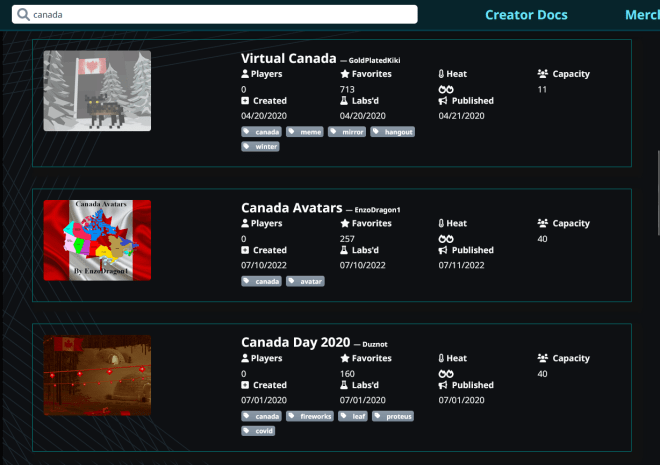WARNING: This blogpost goes off on a couple of tangents, including a recent report on faltering sales of the Apple Vision Pro, plus a new update at the very end with some very insightful commentary on Meta’s Horizon Store plans and how they might negatively impact the VRChat in-world creator economy, which is still in beta test.
On April 22nd, 2024, Meta (the company formerly known as Facebook) made an announcement titled A New Era for Mixed Reality:
Today we’re taking the next step toward our vision for a more open computing platform for the metaverse. We’re opening up the operating system powering our Meta Quest devices to third-party hardware makers, giving more choice to consumers and a larger ecosystem for developers to build for. We’re working with leading global technology companies to bring this new ecosystem to life and making it even easier for developers to build apps and reach their audiences on the platform.

This new hardware ecosystem will run on Meta Horizon OS, the mixed reality operating system that powers our Meta Quest headsets. We chose this name to reflect our vision of a computing platform built around people and connection—and the shared social fabric that makes this possible. Meta Horizon OS combines the core technologies powering today’s mixed reality experiences with a suite of features that put social presence at the center of the platform.
Of course, this also includes the Meta Quest Store, which will apparently be renamed the Meta Horizon Store:
Developers and creators can take advantage of all these technologies using the custom frameworks and tooling we’ve built for creating mixed reality experiences, and they can reach their communities and grow their businesses through the content discovery and monetization platforms built into the OS. These include the Meta Quest Store, which contains the world’s best library of immersive apps and experiences—we’re renaming it to the Meta Horizon Store.
And, as you might expect with a company whose profits still largely derive from social media based on surveillance capitalism, you’d best believe that Meta wants to make sure that it inserts itself into all the social aspects of this technology, as it licenses the tech to other companies:
The Horizon social layer currently powering Meta Quest devices will extend across this new ecosystem. It enables people’s identities, avatars, and friend groups to move with them across virtual spaces and lets developers integrate rich social features into their apps. And because this social layer is made to bridge multiple platforms, people can spend time together in virtual worlds that exist across mixed reality, mobile, and desktop devices. Meta Horizon OS devices will also use the same mobile companion app that Meta Quest owners use today—we’ll rename this as the Meta Horizon app.
It looks very much as though the word Quest is going to be replaced by the word Horizon throughout (much as Oculus was replaced by Quest previously). I guess those Meta marketing people need to justify their paycheques by constant rebranding! Gotta keep it fresh! Personally, I think they should have stuck with Oculus… 😉
Also part of this announcement are three key partnerships with third-party hardware developers:
- ASUS and its Republic of Gamers subsidiary “will use its expertise as a leader in gaming solutions to develop an all-new performance gaming headset.”
- Lenovo will apparently focus on education and the workplace: “Lenovo will draw on its experience co-designing Oculus Rift S, as well as deep expertise in engineering leading devices like the ThinkPad laptop series, to develop mixed reality devices for productivity, learning, and entertainment.”
- Meta will also be working with Xbox to create a limited-edition Meta Quest (Microsoft and Meta also worked together recently to bring Xbox cloud gaming to the Quest).
Reactions to this new on Reddit have varied. One person on the r/VisionPro subreddit (hardly an impartial source!) commented, “Feels more closed than Apple. And also less developer friendly.” (As if Apple doesn’t have its own walled-garden approach to its technology.)
Also mentioned in Meta’s announcement was that software developed through the Quest App Lab will be featured in the newly-renamed Horizon Store:
As we begin opening Meta Horizon OS to more device makers, we’re also expanding the ways app developers can reach their audiences. We’re beginning the process of removing the barriers between the Meta Horizon Store and App Lab, which lets any developer who meets basic technical and content requirements ship software on the platform. App Lab titles will soon be featured in a dedicated section of the Store on all our devices, making them more discoverable to larger audiences.
I think that this is good news for smaller developers, who often struggle to get word out about their products. (Of course, Meta will get a cut of any sales through its store!)
In an Engadget report by Devindra Hardawar, she writes:
Think of it like moving the Quest’s ecosystem from an Apple model, where one company builds both the hardware and software, to more of a hardware free-for-all like Android. The Quest OS is being rebranded to “Meta Horizon OS,” and at this point it seems to have found two early adopters. ASUS’s Republic of Gamers (ROG) brand is working on a new “performance gaming” headsets, while Lenovo is working on devices for “productivity, learning and entertainment.” (Don’t forget, Lenovo also built the poorly-received Oculus Rift S.)
As part of the news, Meta says it’s also working on a limited-edition Xbox “inspired” Quest headset. (Microsoft and Meta also worked together recently to bring Xbox cloud gaming to the Quest.) Meta is also calling on Google to bring over the Google Play 2D app store to Meta Horizon OS. And, in an effort to bring more content to the Horizon ecosystem, software developed through the Quest App Lab will be featured in the Horizon Store. The company is also developing a new spatial framework to let mobile developers created mixed reality apps.
Devindra does have a good point; Apple has long been opposed to opening up its hardware to third-parties (and it would appear, based on recent media reports, that sales of the eyewateringly-pricey Apple Vision Pro are not as brisk as the company had hoped):
Apple has dropped the number of Vision Pro units that it plans to ship in 2024, going from an expected 700 to 800k units to just 400k to 450k units, according to Apple analyst Ming-Chi Kuo.
Orders have been scaled back before the Vision Pro has launched in markets outside of the United States, which Kuo says is a sign that demand in the U.S. has “fallen sharply beyond expectations.” As a result, Apple is expected to take a “conservative view” of headset demand when the Vision Pro launches in additional countries.
Kuo previously said that Apple will introduce the Vision Pro in new markets before the June Worldwide Developers Conference, which suggests that we could see it available in additional areas in the next month or so.
Apple is expecting Vision Pro shipments to decline year-over-year in 2025 compared to 2024, and the company is said to be “reviewing and adjusting” its headset product roadmap. Kuo does not believe there will be a new Vision Pro model in 2025, an adjustment to a prior report suggesting a modified version of the Vision Pro would enter mass production late next year.

I find it an absolutely fascinating time to be working in virtual reality, augmented reality, mixed reality, and spatial computing! While Apple has aimed for the high-end with its US$3,500 headset, Meta has focused its attention on the low end, with a wireless headset that is seven times cheaper than the Apple Vision Pro! (Of course, you could also use the Quest 3 as a PCVR headset, but most people don’t do that.)
I never would have predicted that we’d have two firmly-set goalposts at each end of the field, instead of companies releasing a mass of options in the middle of the field! This leaves a huge gap between the ultra-low-end Meta Quest 3 and the ultra-high-end Apple Vision Pro, and I do believe that there is certainly opportunity for companies to fill that gap, with existing hardware (e.g. the Valve Index, the Vive Pro 2, etc.), as well as some new devices which fall in between the two extremes.
I think that Meta is very smart to partner up with third parties who already have some experience in this space (notably Lenovo), and from those partnerships, new products will spring up to address that gap. While it will likely not be until 2025 or 2026 until we see the fruit of these new partnerships, interesting times are ahead!
UPDATE April 26th, 2024: I sometimes post my blogposts to the various virtual world and virtual reality Discord servers I belong to, in order to drive a bit more traffic to my blog (I don’t do it nearly as often as I used to, though). And PK, on the MetaMovie Discord server, made the following insightful and thought-provoking comment on this announcement from Meta/Facebook:
I want someone to dig into what sort of access Meta would have to data on these third-party headsets, potentially, through various software that would be required. I think it’s existential that we need to keep metaverse data out of their hands.
Even now, having failed with five or six different social VR attempts so far, they still manage to collect 1/3 of every virtual transaction in VRChat, at least those using Quest headsets, which is the majority of users now. Their [i.e., VRChat’s]creator economy is only in beta so far, but thanks to Facebook and Steam, and Apple for pushing this model, we don’t have the thriving virtual economy we would have had by now, because even taking 1% of every transaction just for monopolizing app downloads, that would be too much. A third is robbery, but because [Meta CEO Mark] Zuckerberg could afford to make mobile headsets affordable without worrying about profits so far, they’re now cornering commerce in this space. I don’t think it’s safe to trust them with our future, and so I’m very skeptical about these sorts of initiatives.

PK is correct; it is troubling that the walled-garden gatekeepers like app store owners (Meta, Google/Android, and Apple) are each taking a cut of any in-world transactions. It has a chilling effect on anybody trying to make money within VRChat (of course, the social VR platform has long had a booming economy going on outside of VRChat, with places such as the Virtual Market series of avatar shopping events and the VRCMods Discord server, where avatar buyers and sellers can connect).
Linden Lab was luckily able to avoid this entire mess by creating its own in-world economy within Second Life well before the advent of Google Play and Apple’s App Stoe—but now that they are actively working on a new mobile Second Life app for Android and iOS, it will be interesting to see whether Second Life, too, will be impacted by other players like Meta wanting to take their cut. (Probably not, since you can do things like buy Linden dollars directly from the Second Life website.)
Interesting times lie ahead! As drag queen RuPaul likes to say on her hit reality TV show, RuPaul’s Drag Race (and my guilty pleasure!):

Thank you to PK of the MetaMovie Discord, for giving me permission to quote them directly!












